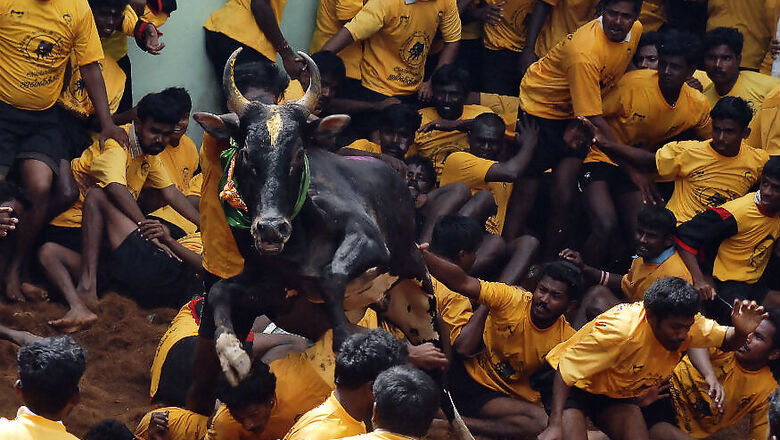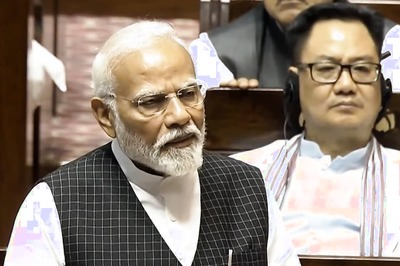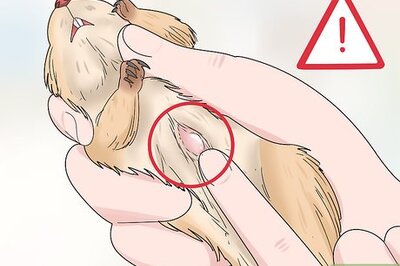
views
In the present raging bull story, Jallikattu, the central government has tried to wash its hands away by painting it as a sport and sports being a state subject, the state of Tamil Nadu has to deal with the issue.
This is a naïve argument since JalliKattu has never been given the status of a sport by the Union Ministry of Youth Affairs & Sports or by any state government.
In order to qualify to be included in the official category of sports, the discipline needs to have a registered body like a federation/association starting from club, district, state and national level which is affiliated to the respective state sports councils and also recognised by the state/central government.
To get recognition from the government, the sports body will have to conduct regular competitions at different levels. Under these criteria, JalliKattu does not qualify to be categorised as a sport.
As rightly argued by the Tamil Nadu state government, Jallikattu is a cultural event traditionally followed for centuries and celebrated on a specific day of the year by a particular section of the Tamilian society to coincide with the Hindu festival of Mattu Pongal.
The event, which is essentially of taming the bulls, is much adventurous and recreational in nature. Unlike what happens in the bull fights in Spain, no bodily injury is done to the bull except what happens by accident.
This adventurous activity does not come under the administrative control of the Sports Authority of Tamil Nadu or under the sports department of the state government. As such it is unsporting on the part of the central government to disown its responsibility while dealing with the issue of a cultural event by painting it as a sports event and palm it off to the state to find a solution.
Going by the attitude of the central government, the traditional “Puli Kali”, which forms part of Muharram festival too will qualify as a sport. Recreation and sports can coexist but both have their own distinctive character and there should be no mix up. The present Tamilian anger against banning their traditional cultural festival Jallikattu and the lacklustre response of the central government towards it need to be seen against this background.
Now comes the real issue of cruelty to animals.
Let the animal lovers, who vociferously argue for a ban on Jallikattu on grounds of cruelty to bulls, for a moment keep aside their love for poor man’s bulls and look towards rich man’s horses.
The double standard taken by the animal rights organisations which fight for prevention of cruelty to animals falls flat at the altar of horse racing.
These organisations are aware of the cruelty which is meted out to race horses but prefer to keep their mouths shut to please the mighty rich men who own race horses and stud farms.
Members of PETA (People for Ethical Treatment of Animals), SPCA (Society for Prevention of Cruelty to Animals) and Animal Welfare Board of India (AWBI) which want to ban Jallikattu, sculling of street dogs and using elephants in temple festivals do not shy away from attending derbies, betting on horses and winning jackpots at races. Pretending to be oblivious of what goes behind the screen there.
Horse racing is a multimillion industry patronised by the rich, influential and powerful who often remain beyond the reach of law. It is a well guarded secret that horse racing is the worst example of cruelty to animals.
Horses are castrated in order to make them fit for training as race horses. The only ones spared are stallions (Studs) intended for breeding; called “gelding”, castration is done as early as when the horse is two years old. The horses are gelded by laying them down, holding up the uppermost hind leg, and an incision is made in the scrotum. The testicle is removed with its covering, the spermatic cord is pulled down, and it is crushed, then cut to remove the testicle and all. The procedure is repeated on the other side.
True animal lovers maintain that castration is mutilation and damaging to the animal’s psyche as it loses it sexual powers and becomes impotent for life. Still these horses suffer silently to keep their masters and spectators happy by winning races.
The argument, given by the horse breeders in favour of gelding, is that gelded horses lose their aggression and therefore they are much easier to handle and train for races.
Cruelty to race horses does not end with castration.
Whipping the horses by specially designed whips in order to make them run faster is another form of cruelty the horses are subjected to.
Horses try to run faster at the races, not because of the love they have for their jockeys or for spectators who bet on them, only to escape from the pain inflicted upon them through repeated whipping by the rider.
More pain, still faster and the applause that is the sequence there.
Horse races are also notorious for drug abuse (doping). Horses are administered with prohibited drugs which include the dreaded anabolic steroids, hormones, stimulants and pain killers in order to make them stronger and faster for races at the peril of their health.
Horses which get injured during races and fracture their legs, instead of getting rehabilitated are subjected to euthanasia (mercy killing) as they are of no further use for races. This mercy killing is done by injecting lethal dose of barbiturates or by shooting them dead. The carcass is then sold as meat or buried.
All such cruelties happen behind the closed doors of stud farms where dozens of horses are bred by millionaires. Self-styled animal lovers refuse to look inside the stud farms and see what happens there. Instead, they prefer to buy tickets for races where they sit along with the rich and enjoy the races run by these castrated, drugged and whipped animals.
After winning huge bets there, they come out and eloquently talk about stopping cruelty to animals. They don’t even shy away from denying poor men their livelihood in the guise of protecting the animals. This is what PETA did, when instead of going to court to get an ban on horse racing on the ground of cruelty to horses, it went after the poor who make a living by running horse carriages on Mumbai streets.
On a petition filed by PETA on 8 June 2015, the Bombay High Court ruled that horse drawn carriages must be phased out of Mumbai roads within a year.
PETA’s argument in this petition was that horses and heavy traffic are a dangerous combination and as long as horse drawn carriages are allowed on Mumbai streets, humans and horses are in danger of injuries or worse. They argued that animals are not comfortable around noisy speeding vehicles and get spooked easily, which is why accidents between carriages and automobiles are common. But they did not tell the court that more number of horses are castrated, drugged and whipped and they along with their jockeys do get injured, maimed or killed during training and during races and that is a more serious issue which the court has to look into.
However, in April 2016, the Supreme Court stayed the high court order pending review petition on horse carriages on Mumbai roads. Not satisfied PETA went up to the extent of calling upon the public of Mumbai to prevent horses from suffering even longer on the streets of Mumbai by urging Maharashtra government to implement the ban on 'Victorias'(horse carriages). But it did not found it prudent to call upon the public to come against race horses’ owners and stud farm owners who indulge in castrating horses, doping them, whipping them and even gunning them down in order to promote their business interests.
A nation which prefers to close its eyes on horse racing has no business to interfere with the local tradition and festivals like Jallikattu on the grounds of cruelty to animals. Just because it does not get the patronage of the rich and influential and remains as a poor man’s recreation, Jallikattu should not be targeted by organisations in the guise of protecting animal rights. Instead, it would be better advised if they fight for bringing down the curtains on horse racing if they really intend to protect animal rights.
Ironically, the protests against the ban on JalliKattu are happening in the city of Chennai where the first racing club of the country, the Madras Racing Club was established in 1837.
Let a new agitation on animal rights start in Chennai itself to protect the rights of the horses.
(Disclaimer: Dr PSM Chandran is the President, Indian Federation of Sports Medicine. Views expressed are personal)

















Comments
0 comment